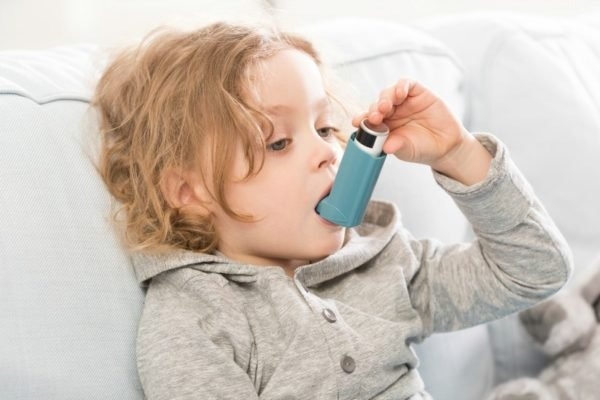
Causes Of Bronchial Asthma In Children
16 Jul 2018 | 5 min Read
Dr Shruti Surve
Author | 2 Articles
Changing weather conditions and increasing pollution have left millions of people exposed to a myriad of health issues. Asthma in children is one such health issue. India, alone, has 10% of the world’s asthmatics, a number that reaches an estimated 15-20 million asthmatics, according to WHO.
What is asthma?
Asthma is a disease of the lungs that makes it difficult for a person to breathe normally. Our lungs are a tree-like network of interconnected air-pipes. Asthma causes these pipes to inflame, their lumen to get filled with mucous, and the airways to constrict. The volume left for transport of air is so reduced that the individual suffers from breathlessness. It is almost as if you were asked to breathe through a straw that kept getting narrower. In addition, the inflamed airways react more strongly to allergens, which may further aggravate inflammation and worsen the existing situation.
Bronchial asthma in children
Asthma is the most common respiratory chronic disease, and its numbers are only increasing. The disease can begin at any age in an individual; however, most people have their first symptoms before the age of 5 years. Asthma in children is thus, an important concern. Though the exact causes of asthma in children are unclear, certain risk factors have been identified as listed below:
- Parents or siblings with a history of asthma
- Exposure to tobacco smoke before or after birth
- Frequent respiratory infections during early childhood
- Low birth weight or premature birth
- Nasal allergies
- Eczema
What are the symptoms of asthma?
The symptoms of asthma vary over a wide range. These can include:
- Frequent coughing spells
- Extreme coughing while play, at night, or while laughing or crying
- Chronic cough well beyond 2-3 weeks
- Less energy during play and uninterested demeanor of the child
- Rapid breathing
- Complaint of chest tightness or chest “hurting”
- Whistling sounds when breathing – wheezing
- A great effort needed to breathe
- Shortness of breath, loss of breath
- Tightened neck and chest muscles
- Feelings of weakness or tiredness prolonged over a duration of time
Apart from these, some symptoms of asthma in kids, like a hyper-reaction, an extreme allergy, asthma attack coupled with rashes on the body, or a spell of asthmatic attacks demand immediate medical attention. The child might complain of tightness in the chest or pain in the chest.
Beware of the triggers
Asthma in children might be triggered due to any of the following:
- Allergens, pollens, dust, etc.
- Cigarette smoke
- Areas with heavy air pollution
- Exposure to chemicals or dust
- Certain materials, when sprayed
- Colds and other viral upper respiratory infections
- Physical activity including exercise and sometimes sports
Managing asthma
Asthma affects different people differently. While one child may suffer from constant symptoms on an everyday basis, another may experience symptoms only once in a blue moon. Whatever may be the case, you have to be actively involved in managing asthma. If you experience symptoms more than 3 times a week, your asthma is not well managed.
Following what the doctor says religiously is of prime importance. Jot down your questions and ask the doctor at the next visit. Make sure the child takes medicines on time. Understand how the inhaler works and keep it with you at all times.
Be aware. Read as much as you can about asthma, and be well equipped with knowledge. Understand how a child’s body responds to different allergens, understand the pattern, and avoid troublemakers. Devise self-management techniques for the child.
Let your child stay active. It is not true that asthma in children restricts them from playing sports. With precautions, and slowly acclimating the body, the child can indulge in physical activities and be healthy.
Management to bronchial Asthma
Apart from the symptomatic use of short acting bronchodilators such as salbutamol or terbutaline along with anti-inflammatory agents such as inhaled steroid like budesonide or fluticasone propionate and other oral corticosteroid agents cases of bronchial asthma show a great deal of response to alternative treatment like homoeopathy. There are cases recorded which eventually over a period of time having taken a course of homoeopathic medications have completely off the bronchodilators and corticosteroid therapy.
Homoeopathic drugs over a period of time helps to reduce the hyper responsiveness of the respiratory tract to the allergens and heal naturally. They strengthen the immune system and hence help to fight out the recurrent viral and bacterial infections without the use of external antibiotic agents.
Hence it is highly recommended especially in cases of infants and children with a family history of bronchial asthma or obstructive pulmonary diseases or otherwise as well as children prone to recurrent cold cough and fever, to consult a homoeopathic practitioner and consult regarding the nature of treatment and it’s benefits.
Source:
https://www.nejm.org/medical-research/asthma
https://www.ncbi.nlm.nih.gov/pmc/articles/PMC4995682/
http://www.jaci-inpractice.org/article/S0091-6749(11)01793-3/abstract
Also read: Make Each Breath Count with Inhalation Therapy
A


Related Topics for you
Suggestions offered by doctors on BabyChakra are of advisory nature i.e., for educational and informational purposes only. Content posted on, created for, or compiled by BabyChakra is not intended or designed to replace your doctor's independent judgment about any symptom, condition, or the appropriateness or risks of a procedure or treatment for a given person.
